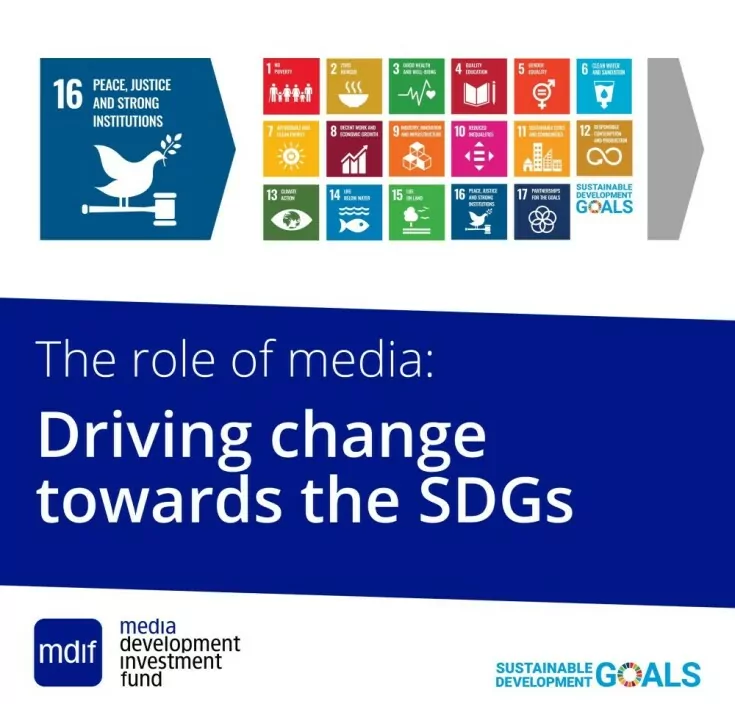As the Global Week to #Act4SDGs continues, we are publishing excerpts from our brief “The role of media: Driving change towards the SDGs”. Here we discuss the relationship between media and the United Nations’ Sustainable Development Goals (SDGs) and the role of media in driving change towards Agenda 2030.
“If information and knowledge are central to democracy, they are the conditions for development. It is that simple”
–Kofi Annan, former UN Secretary General[i]
Free access to information and independent media have long been championed by the international community and are an essential component of the SDGs, where media support “peace, justice and strong institutions” under SDG 16, in particular target 16.10, where they facilitate public access to information. However, media have a wider importance than SDG 16 and are a pre-condition for progress and implementation of all development targets[ii]. In fact, “discussions on the media’s role in achieving the SDGs too often focus narrowly on target 16.10”, failing to capture “the important multiplier effects of media development for the realisation of SDG 16 and of Agenda 2030 more broadly”[iii].
From SDG 2 No Poverty (a low level of press freedom is strongly associated with a high percentage of people living below the poverty line[iv]) to SDG 5 Gender Equality (high exposure to mass media is positively associated with an increase in women’s empowerment[v]), journalism acts as a driver of change and forms the foundation of a healthy information environment that can help the world deal with challenges of our times[vi] and achieve a sustainable society[vii].
Private media ownership is associated with better governance, more political rights for citizens, more developed markets and better outcomes in the areas of education and health[viii]. Independent news organisations free from the control of governments, political parties and other partisan interests foster dialogue and respect for individual rights, and give society a platform to express its multiple voices. In addition to enhancing democratic governance and transparency, media contribute to development by bringing about beneficial changes in the behaviours of individuals, groups and organisations and provide a means of exercising human rights[ix].
Where the media perform the roles of agenda-setter and gatekeeper effectively, they can produce many forms of public benefit that make governments more transparent and less corrupt, and societies more informed, inclusive and sustainable. In fact, each dollar spent on a journalistic investigation can yield hundreds or thousands of dollars in benefits to society[x]. Gains are shared by the whole community, who can experience the galvanising change brought about by reporting, whether it is the start of a citizen-led protest, the enactment of a new law or the dismissal of an incompetent official.
Read the full brief “The role of media: Driving change towards the SDGs” here.
[i] UN (1997). “Address to World Bank Conference Global Knowledge 1997”
[ii] SDG Accountability Portal (2019). “Engaging with the Media”; UNESCO (2019) “Why independent media matter for the SDGs”
[iii] UNDP, UNESCO (2019). “Entry points for media development to support peaceful, just and inclusive societies and Agenda 2030”
[iv] Guseva, M et al. (2008). “Press freedom and development: an analysis of correlations between freedom of the press and the different dimensions of development, poverty, governance and peace”. United Nations Educational Scientific and Cultural Organization
[v] Dasgupta, S (2019). “Impact of exposure to mass media on female empowerment: Evidence from India”. International Journal of Development Issues
[vi] UNESCO (2017). “World Press Freedom Day 2017”
[vii] Bodt, T (2009). “Role of the Media in Achieving a Sustainable Society”. Centre for Bhutan Studies.
[viii] Djankov, S; McLeish, C; Nenova, T; Shleifer, A (2001). “Who Owns the Media?”. Policy Research Working Paper
[ix] Locksley, G (2009). “The Media and Development: What’s the Story?”. Working Papers
[x] Hamilton, J.T (2016). “Democracy’s Detectives: The Economics of Investigative Journalism”. Harvard University Press.
